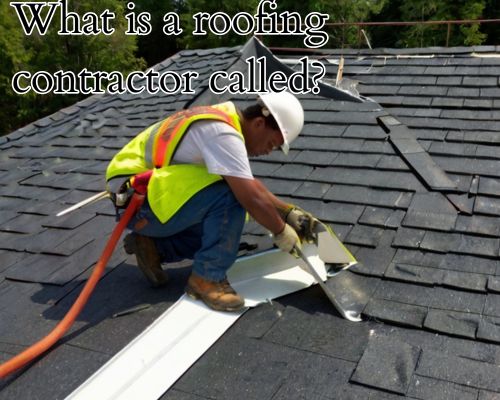When it comes to home improvement in New Jersey, few things are as crucial—and sometimes confusing—as hiring the right professional to work on your roof. You’ve probably asked yourself, “What is a roofing contractor called?” and stumbled on terms like roofer, roofing specialist, or even roofing subcontractor. With Charles Jimerson of CJ Commercial Roofing NJ, let’s unpack this roofing jargon, clarify exactly who does what, and explore why choosing the right expert in New Jersey matters for your home’s safety, value, and style.

Defining the Roofing Contractor: More Than Just a Roofer
In everyday talk, a roofing contractor is often just called a roofer. But technically, a roofing contractor is a licensed professional or company specializing in roof installation, repair, maintenance, and inspection. They manage roofing projects and ensure compliance with local regulations and safety codes.
Salient Entities & Roles in Roofing
- Roofer: The hands-on technician who performs the physical work—installing shingles, repairing leaks, sealing flashing, etc.
- Roofing Contractor: The business or licensed professional responsible for the entire roofing project, including labor, materials, permits, and warranty.
- Roofing Subcontractor: Sometimes, a roofing contractor hires subcontractors specializing in certain roofing materials (like slate or metal) or specific tasks (like gutter installation).
- Roof Inspector: A specialist who evaluates the roof’s condition, often required for insurance claims or real estate transactions.
In New Jersey, these roles are distinct yet interconnected. When you hire a roofing contractor, you’re usually hiring the whole package—not just a solo roofer hammering away.
Why Does the Term Matter for New Jersey Residents?
Understanding the terminology isn’t just semantics—it can save you money, stress, and headaches.
New Jersey Roofing Regulations: Roofing contractors in New Jersey must comply with state licensing, insurance, and safety standards. A “roofer” working independently without proper licensing might put your home at risk and void warranties or insurance claims.
Local Climate Challenges: New Jersey’s diverse weather—from snowy winters in the north to humid summers in the south—demands roofing materials and techniques tailored to the region. A qualified roofing contractor will know which materials withstand local conditions, such as asphalt shingles treated for salt corrosion near the Jersey Shore or ice dam prevention in the mountainous areas.
Common Roofing Contractor Services in New Jersey
1. Roof Installation and Replacement
Whether your New Jersey home has a traditional gable roof, a flat commercial roof, or a modern metal roof, roofing contractors install and replace roofing systems according to your budget and style preferences.
2. Roof Repair and Maintenance
Leaks, wind damage, or storm debris? Roofing contractors provide timely repair services, including patching, resealing, and shingle replacement to keep your roof watertight.
3. Roof Inspections
Many New Jersey homeowners schedule regular roof inspections, especially after hurricane seasons or heavy snowstorms. Licensed contractors assess structural integrity, identify issues early, and recommend preventive maintenance.
4. Gutter and Downspout Installation
Though not strictly “roofing,” many contractors handle gutter systems to ensure proper water drainage—a vital part of roof health in New Jersey’s rainy climate.
What Makes a Roofing Contractor “Qualified” in New Jersey?
Not all roofers are created equal. Here’s what sets licensed roofing contractors apart:
- Licensing and Registration: New Jersey requires roofing contractors to register with the state and carry appropriate licenses.
- Insurance: Valid liability and workers’ compensation insurance protect you from liability in case of accidents on your property.
- Local Experience: New Jersey contractors familiar with local building codes and weather challenges offer superior craftsmanship.
- Warranty and Guarantees: Established roofing contractors often provide warranties on materials and labor, giving homeowners peace of mind.
- Customer Reviews and References: In the digital age, checking online reviews and asking for references is crucial for verifying reliability.
For more, visit https://cjcommercialroofingnj.com/.
Popular Roofing Materials Used in New Jersey
A savvy homeowner knows the roofing material impacts durability, appearance, and cost. Here are common materials New Jersey roofing contractors handle:
- Asphalt Shingles: Most popular for residential homes due to affordability and good weather resistance.
- Metal Roofing: Growing in demand for durability, energy efficiency, and modern look.
- Slate and Tile: Traditional, long-lasting options favored in historic or upscale New Jersey neighborhoods.
- Rubber Membrane (EPDM): Preferred for flat or commercial roofs for waterproofing.
How to Choose the Right Roofing Contractor in New Jersey
- Verify Credentials: Always ask for proof of licensing and insurance.
- Request Detailed Estimates: Compare multiple quotes to understand labor, materials, and timeline.
- Check References: Talk to previous customers or look up online reviews.
- Discuss Local Experience: Contractors familiar with New Jersey’s weather and codes handle permits and inspections better.
- Clarify Warranty Terms: Understand what’s covered and for how long.
Conclusion: Know What to Call Your Roofing Expert and Why It Matters
In short, a roofing contractor in New Jersey is more than just a “roofer.” They are licensed professionals or companies managing your entire roofing project—from inspections and repairs to installations and warranties—while navigating local regulations and climate challenges. Understanding this distinction helps homeowners choose trusted experts, avoid costly mistakes, and protect their investment in the Garden State’s ever-changing weather.
Bonus Tips for New Jersey Homeowners
- Schedule a roof inspection every 3-5 years or after severe storms.
- Consider energy-efficient roofing materials to lower utility bills.
- Don’t ignore minor roof damage; small leaks can lead to big problems in New Jersey’s humid climate.
- Always get contracts in writing before work begins.
Ready to call your roofing contractor in New Jersey? Use these insights to make a smart, safe, and savvy choice. Your roof—and your home’s value—will thank you!
